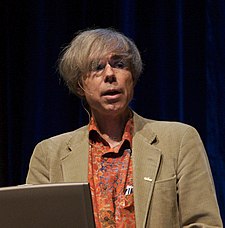
Back دوغلاس هوفشتادتر Arabic دوجلاس هوفشتادتر ARZ داقلاس هافستادر AZB Дъглас Хофстатър Bulgarian Douglas Hofstadter Catalan Douglas Hofstadter Czech Douglas R. Hofstadter German Douglas Hofstadter Spanish Douglas Hofstadter Estonian داگلاس هافستادر Persian
Douglas Hofstadter | |
|---|---|
 Hofstadter in 2006 | |
| Born | Douglas Richard Hofstadter February 15, 1945 New York City, US |
| Education | Stanford University (BS) University of Oregon (PhD) |
| Known for | Gödel, Escher, Bach I Am a Strange Loop[3] Hofstadter's butterfly Hofstadter's law |
| Spouse(s) | Carol Ann Brush (1985–1993; her death) Baofen Lin (2012–present) |
| Children | 2 |
| Awards | National Book Award Pulitzer Prize Member of the American Academy of Arts and Sciences Golden Plate Award of the American Academy of Achievement[1] |
| Scientific career | |
| Fields | Cognitive science Philosophy of mind Artificial Intelligence Physics |
| Institutions | Indiana University Stanford University University of Oregon University of Michigan |
| Thesis | The Energy Levels of Bloch Electrons in a Magnetic Field (1975) |
| Doctoral advisor | Gregory Wannier[2] |
| Doctoral students | David Chalmers Robert M. French Scott A. Jones Melanie Mitchell |
| Website | cogs.sitehost.iu.edu/.. |
Douglas Richard Hofstadter (born February 15, 1945) is an American cognitive and computer scientist whose research includes concepts such as the sense of self in relation to the external world,[3][4] consciousness, analogy-making, strange loops, artificial intelligence, and discovery in mathematics and physics. His 1979 book Gödel, Escher, Bach: An Eternal Golden Braid won the Pulitzer Prize for general nonfiction,[5][6] and a National Book Award (at that time called The American Book Award) for Science.[7][note 1] His 2007 book I Am a Strange Loop won the Los Angeles Times Book Prize for Science and Technology.[8][9][10][11]
- ^ "Golden Plate Awardees of the American Academy of Achievement". www.achievement.org. American Academy of Achievement.
- ^ Hofstadter, Douglas Richard (1975). The Energy Levels of Bloch Electrons in a Magnetic Field (PhD thesis). University of Oregon. ProQuest 288009604.
- ^ a b Hofstadter, Douglas R. (2008) [2003]. I Am a Strange Loop. New York, NY: Basic Books. ISBN 978-0-465-03079-8.
- ^ Hofstadter, D. R. (1982). "Who shoves whom around inside the careenium? Or what is the meaning of the word "I"?". Synthese. 53 (#2): 189–218. doi:10.1007/BF00484897. S2CID 46972278.
- ^ "General Nonfiction" Archived February 26, 2012, at the Wayback Machine. Past winners and finalists by category. The Pulitzer Prizes. Retrieved March 17, 2012.
- ^ A bedside book of paradoxes Archived March 26, 2017, at the Wayback Machine, New York Times
- ^ "National Book Awards – 1980" Archived August 13, 2014, at the Wayback Machine. National Book Foundation. Retrieved March 7, 2012.
- ^ "And the L.A. Times Book Prize winners are..." Los Angeles Times. April 26, 2008. Retrieved April 10, 2023.
- ^ "Book Prizes – Los Angeles Times Festival of Books» Winners by Award". Archived from the original on April 5, 2013. Retrieved September 25, 2012.. Events.latimes.com (November 22, 1963). Retrieved on 2013-10-06.
- ^ Douglas Hofstadter at DBLP Bibliography Server
- ^ Douglas Hofstadter's publications indexed by the Scopus bibliographic database. (subscription required)
Cite error: There are <ref group=note> tags on this page, but the references will not show without a {{reflist|group=note}} template (see the help page).